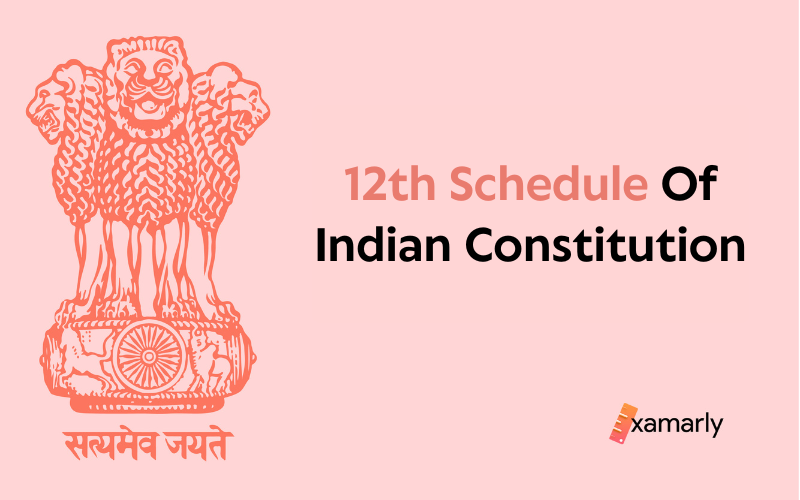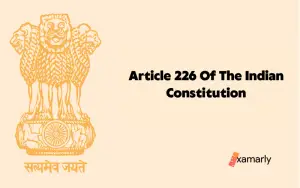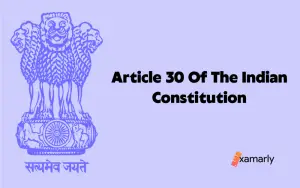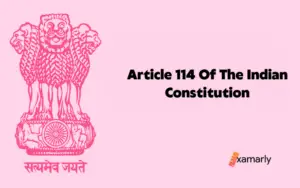In order for Municipalities to function as local governments, the 12th Schedule of Indian Constitution contains laws that specify their rights, obligations, and authorities. It was included by the 74th Amendment Act of 1992.
The 12th Schedule of Indian Constitution is crucial from the exam perspective, so keep reading to discover more about it. This article is valuable for competitive exams like UPSC.
- What Is The 12th Schedule Of Indian Constitution?
- Major Provisions
- Conclusion
- FAQs
- What Are The Schedules Of The Constitution Of India?
- The 12th Schedule Of Indian Constitution Refers To Which Article?
- How Many Subjects Are Listed In The Twelfth Schedule Of Indian Constitution?
- Which Amendment Introduced Schedule 12 To Indian Constitution?
- Does The 12th Schedule Of The Indian Constitution Apply To Both Municipalities And Panchayats?
What Is The 12th Schedule Of Indian Constitution?
The duties of municipalities are covered under Schedule 12 of the Indian Constitution, which is relevant because local government municipalities must adhere to its provisions. 74th CAA of 1992 included this schedule in the Constitution of India.
The 74th amendment of the constitution of India formed the system of urban administration as a constitutional right. The Indian municipalities were granted constitutional status as a result. The act intends to develop and revitalize urban governments so they can perform efficiently as local governmental bodies.
- The urban administration system was made a fundamental privilege by the 74th amendment of Indian Constitution.
- Urban governments are to be developed and revitalized by the legislation in order for them to function effectively as local governing organizations.
- It contains 18 subject matters under the schedule that are very important for the well-being of local people.
- Those 18 subject matters include initiatives like solid waste management, ecological aspects, public conveniences, street lighting, public health, land reforms, and other forms of oaths.
- This schedule aims to work for society in general and other weaker sections of society in particular.
Major Provisions
Article 243 W: Under Article 243 W, all municipalities would be granted the authority and duties required to carry out their respective roles as efficient institutions of self-government.
By means of legislation, the State Legislature may define the rights and obligations of municipalities with regard to creating plans for social justice and economic growth and carrying out projects handed to them.
Forms of Municipal Committees: It specifies three different types of municipal committees, including Nagar Panchayats for transitional regions, Municipal Councils for smaller urban areas, and Municipal Corporations for larger metropolitan areas.
The twelfth Schedule of Indian Constitution contains 18 matters as listed below:
- Town planning is a part of urban planning
- Regulation of land use and construction of buildings.
- Planning for social development and economic development as well.
- Bridges and Roads
- Water supply for industrial, domestic, and commercial purposes.
- Health services, trash management, and sanitation conservation.
- Fire services.
- Urban forestry, environmental preservation, and ecological awareness.
- Defending the rights of society’s less powerful groups, such as the physically and mentally challenged.
- Slum improvement and upgradation.
- Urban poverty alleviation.
- Providing urban conveniences and amenities like playgrounds.
- Promotion of educational, cultural, and aesthetic aspects.
- Burial grounds and Electric crematoriums.
- Cattle pounds; prevention of cruelty to animals.
- Vital statistics include the registration of births and deaths.
- Street illumination, parking lots, bus stations, and other public amenities.
- Regulation of slaughterhouses and tanneries.
Conclusion
In the list of schedules, there are a total of 12 schedules. The twelfth schedule specifies the rights, duties, and obligations of municipalities. It specifies the major responsibilities of the municipal corporation towards society. Some matters are – slum improvements, cremation grounds, proper bus stops, regulation of slaughter houses, and many more. It includes a total of 18 such matters that are the responsibilities of municipality.
The list of matters that comes under the scope of municipalities that was just presented is significant for enhancing local peoples’ well-being.
For competitive exam preparation, this article is worth reading as it addresses all the points revolving around Schedule 12.
Link of Relatable Articles are tabulated below.
FAQs
What Are The Schedules Of The Constitution Of India?
Schedules are the tables that contain additional details about the Indian Constitution. The articles don’t make any mention of them. The Indian Constitution has 12 schedules in total.
The 12th Schedule Of Indian Constitution Refers To Which Article?
Article 243 W is covered under the 12th schedule of the Constitution of India.
How Many Subjects Are Listed In The Twelfth Schedule Of Indian Constitution?
A3. There are a total of 18 subjects included in the 12th schedule of Indian Constitution.
Which Amendment Introduced Schedule 12 To Indian Constitution?
The 74th amendment of the Indian Constitution incorporated the 12th schedule.
Does The 12th Schedule Of The Indian Constitution Apply To Both Municipalities And Panchayats?
Only municipal activities are covered under the Indian Constitution’s 12th Schedule. The Panchayats’ authority and duties are outlined in the eleventh schedule.






